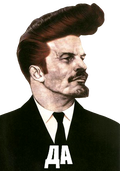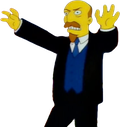(Vladimir Ilyich Ulyanov; Simbirsk, 1870 - Nijni-Novgorod, 1924) born on april 22 was a Russian communist leader who led the October Revolution and created the Soviet communist union. A member of a middle-class family in the Volga region, his animosity against the tsarist regime was exacerbated after the execution of his brother in 1887, accused of conspiracy. He studied at the Universities of Kazan and Saint Petersburg, where he settled as a lawyer in 1893.
His activities against the tsarist autocracy led him to come into contact with the main Russian revolutionary leader of the time, Georgy Plekhanov, in his exile from Switzerland (1895); it was he who convinced him of the Marxist ideology. Under his influence, he helped found in Saint Petersburg the League of Combat for the Liberation of the Working Class, the embryo of the Russian Social Democratic Labor Party chaired by Plekhanov.
In 1897, Lenin was arrested and deported to Siberia, where he devoted himself to the systematic study of the works of Marx and Engels. After his liberation in 1900 he went into exile and founded the newspaper Iskra (the spark) in Geneva, in collaboration with Plekhanov
In the II Congress of the Russian Social Democratic Party (1903), Lenin imposed those ideas at the head of the radical Bolshevik group, which defended his strongly disciplined party model as the vanguard of a revolution that he believed was viable in the short term; In 1912, the break with the Plekhanov and Martov Menshevik minority would be definitively confirmed, attached to a mass party model that would prepare the conditions for the triumph of the workers' revolution in the longer term.
In 1905 Lenin returned to Saint Petersburg to participate in the revolution that had broken out in Russia, Lenin considered that movement as a "dress rehearsal" of the socialist revolution, of which he especially appreciated the spontaneous organizational form of the Russian revolutionaries, such as the soviets or popular councils. he would go into exile again in 1907 due to the failure of the revolution.
Lenin was completing a revolutionary program of immediate application for Russia: mixing the heritage of Marxism with the insurrectionary tradition of Louis Auguste Blanqui, he proposed to anticipate the revolution in Russia by being this one. from the "weak links" of the capitalist chain, where a small group of determined and well-organized revolutionaries could drag the working and peasant masses into a revolution, from which a socialist state would emerge.
The outbreak of the First World War (1914-18) gave him the opportunity to put his ideas into practice: he defined the conflict as the result of the contradictions of capitalism and imperialism and, in the name of proletarian internationalism, later, the deterioration of the tsarist regime as a result of the war allowed him to think about launching the socialist revolution in his country as the first step towards an era of world revolution.
The Russian Revolution 
When the February Revolution of 1917 overthrew Tsar Nicholas II and brought Kerensky to power, Lenin rushed back to Russia with the help of the German army (which saw in Lenin an agitator capable of weakening his enemy Russia). He published his April Theses ordering the Bolsheviks to cease support for the provisional government and to prepare their own revolution by claiming "all power to the Soviets."
A first failed attempt in July forced him to take refuge in Finland, leaving Trotsky to lead the party to seize power through a coup in early November 1917 . The coup became the triumphant October Revolution thanks to the Bolshevik strategy of focusing their demands on the end of the war and the distribution of land . Lenin immediately returned to preside over the new government or Council of People's Commissars.
As the leader of the Bolshevik Party , he has since directed the building of the first socialist state in history. He fulfilled his initial promises by removing Russia from the war for the Peace of Brest-Litowsk (1918) and distributing expropriated land to peasants from large landowners.
He delegated to Trotsky the organization of the Red Army, with which he managed to resist the combined attack of the white armies and foreign intervention in the course of a long Civil War (1918-20). Once control of the old empire of the czars was recovered, he articulated the territory by creating the Union of Soviet Socialist Republics (1922), which he gave a formal organization by the Constitution of 1923.
Driven by the needs of the war, but also following his own ideological convictions, he imposed a policy of immediate socialization of the economy, nationalizing the main means of production and subjecting activities to strict central planning (war communism); the difficulties of such a radical transformation caused the collapse of production and a general disorganization of the Russian economy.
Lenin then had to rectify his initial mistakes, convincing his party of the need to introduce the New Economic Policy (1921), which consisted of going back on the path of socialization, leaving a certain margin for freedom of movement. market and private initiative (authorization of foreign investments, freedom of wages), with which it achieved an appreciable economic recovery.
Plagued by a serious illness, Lenin gradually retired from the political leadership, while he saw how his collaborators - especially Trotsky and Stalin - began the dispute over the succession. he eventually passed away in 1924
Lenin is known for establishing the political tradition of Marxism-Leninism, which emphasizes the creation of a dictatorship of the proletariat by means of a revolutionary vanguard party and democratic centralism, in which political decisions reached through free discussion are binding upon all members of the political party.
Lenin is one of the most influential political thinkers of modern history, authoring influential communist texts such as "Imperialism, the Highest Stage of Capitalism", "State and Revolution", and "What Is to Be Done? Burning Questions of Our Movement".
-
What is to be Done
 In which he defended the possibility of making a socialist revolution triumph in Russia as long as it was led by a vanguard of determined professional revolutionaries organized like an army.
In which he defended the possibility of making a socialist revolution triumph in Russia as long as it was led by a vanguard of determined professional revolutionaries organized like an army. -
Imperialism, the Highest Stage of Capitalism:patrick-lenin: he defined the conflict (world war 1) as the result of the contradictions of capitalism and imperialism
-
The State and Revolution :lenin-fancy: Lenin defined this state as a transitory and necessary phase of the dictatorship of the proletariat, which was to prepare the way for the communist future.
-
Lenin's speech: The Middle Peasants ☭ Ленин: О крестьянах-середняках :lenin-cat:
-
Lenin's speech:What Is Soviet Power? / Ленин:Что такое Советская власть?

-
Lenin in October

is a 1937 Soviet biographical drama film -
🐻Link to all Hexbear comms https://hexbear.net/post/1403966
-
📀 Come listen to music and Watch movies with your fellow Hexbears nerd, in Cy.tube](https://live.hexbear.net/c/movies
-
🔥 Read and talk about a current topics in the News Megathread https://hexbear.net/post/4648058
-
⚔ Come talk in the New Weekly PoC thread https://hexbear.net/post/4652037
-
✨ Talk with fellow Trans comrades in the New Weekly Trans thread https://hexbear.net/post/4647580
-
👊 New Weekly Improvement thread https://hexbear.net/post/4641452
-
🧡 Disabled comm megathread https://hexbear.net/post/4592894
-
Parenting Chat https://hexbear.net/post/4638864
reminders:
- 💚 You nerds can join specific comms to see posts about all sorts of topics
- 💙 Hexbear’s algorithm prioritizes comments over upbears
- 💜 Sorting by new you nerd
- 🌈 If you ever want to make your own megathread, you can reserve a spot here nerd
- 🐶 Join the unofficial Hexbear-adjacent Mastodon instance toots.matapacos.dog
Links To Resources (Aid and Theory):
Aid:
Theory:


Big agree on the initiating, prior to meds I was just putting off work stuff that involved contacting people sometimes but now it's not really a problem, although tbh that might just be me being more comfortable doing it now idrk
Regarding sensory stuff, it could improve on a higher dosage. Worth bringing up to your psych and see what they think. I'm totally incapable of tuning things out without meds and have to rely on noise cancelling headphones to just drown out the sound entirely.
Racing thoughts, the fun of the anxiety/ADHD mix is that it's a symptom of both! In my experience, when I'm medicated the head chatter is anxiety related (or music stuck in my head). I didn't really realize it until talking to my psych about it a month ago. I thought it was me building a tolerance and needing a dosage increase. I'd say try to pay attention to what the thoughts are/what context they're happening in and try to sus out whether it's just anxiety. If you're confident it's not, again a dosage increase might help here as well.
Be VERY careful with mixing Vyvanse and alcohol. You can risk a stroke or organ failure, although hopefully your doc already explained that.
Glad it's overall been a benefit though. My regular prodding wasn't a waste of your time then!
Drinking after it's out of your system is fine from what I understand. Vyvanse (and other extended release stims!) when mixed with alcohol will cause the entire remaining dosage to be released into your system all at once and that's when the risks come in.
The more I hear other people's experiences the more I realize how lucky I was that my first psych really knew her shit. Your not the first person I've had to warn about things like that that a doctor shouldn't be letting you leave the appointment without explaining. :/